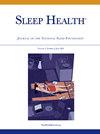SUNRISE研究父母问卷用于评估睡眠和睡眠相关家庭实践的测量特性。
IF 3.4
2区 医学
Q2 CLINICAL NEUROLOGY
引用次数: 0
摘要
背景:很少有问卷具有既定的测量属性,可以全面测量学龄前儿童的睡眠和睡眠相关的家庭实践。目的:检验:(1)SUNRISE父母问卷对学龄前儿童睡眠加速度计的并发效度;(2)睡眠及相关家庭习惯问卷的重测信度。方法:采用问卷调查和Actigraph GTX3+加速度计,采用决策树算法和Sadeh算法对来自30个国家的1737名(4.4±0.6岁)学龄前儿童进行睡眠测量。采用相关分析(持续时间、时间和质量)、配对t检验或Wilcoxon符号秩检验、Bland-Altman图(持续时间、时间)和敏感性、特异性和准确性分析(变异性)来检验并发效度。在来自8个国家的163名参与者(4.3±0.6岁)的子样本中检查了睡眠和家庭实践变量的重测变异性。结果:问卷测量的睡眠时间和持续时间与加速度计测量值相关(r=0.43-0.75;结论:SUNRISE问卷在评估学龄前儿童睡眠特征和相关家庭实践方面是可靠的,特别是在弱势环境中。它可用于夜间睡眠时间的全球监测,以及用于检查学龄前儿童睡眠时间和持续时间与健康指标之间关系的研究。本文章由计算机程序翻译,如有差异,请以英文原文为准。
Measurement properties of the SUNRISE Study Parent Questionnaire for assessing sleep and sleep-related family practices
Background
Few questionnaires with established measurement properties can globally measure sleep in preschoolers and sleep-related family practices.
Objective
To examine (1) concurrent validity of the SUNRISE parent questionnaire against an accelerometer for measuring sleep in preschoolers and (2) test-retest reliability of the questionnaire for sleep and related family practices.
Methods
Sleep was measured using the questionnaire and Actigraph GTX3+ accelerometer using a decision-tree algorithm and the Sadeh algorithm in 1737 preschoolers (4.4 ± 0.6 years) from 30 countries. Concurrent validity was examined using correlation analysis (duration, timing, and quality), paired t test or the Wilcoxon signed-rank test, Bland-Altman plot (duration, timing), and analysis of sensitivity, specificity, and accuracy (variability). Test-retest variability was examined for sleep and family practice variables in a subsample of 163 participants (4.3 ± 0.6 years) from eight countries.
Results
Questionnaire measures of sleep timing and duration were correlated with the accelerometer measures (r = 0.43-0.75; p < .001). Although statistically significant mean differences were observed between questionnaire and accelerometer measures of sleep timing and duration variables, the difference in nighttime sleep duration had a small effect size (−14 min/d; Cohen’s d = −0.2). The questionnaire was less able to provide adequate measurement for sleep quality and variability. High levels of reliability were observed for sleep (ICC = 0.63-0.83; Kappa = 0.53-0.62) and family practice (ICC = 0.81-0.94; Kappa = 0.73-0.86) variables.
Conclusion
The SUNRISE questionnaire appears reliable in assessing preschooler sleep characteristics and related family practices, particularly in disadvantaged settings. It could be used in global surveillance of nighttime sleep duration and in studies examining associations of sleep timing and duration with health indicators in preschoolers.
求助全文
通过发布文献求助,成功后即可免费获取论文全文。
去求助
来源期刊

Sleep Health
CLINICAL NEUROLOGY-
CiteScore
6.30
自引率
9.80%
发文量
114
审稿时长
54 days
期刊介绍:
Sleep Health Journal of the National Sleep Foundation is a multidisciplinary journal that explores sleep''s role in population health and elucidates the social science perspective on sleep and health. Aligned with the National Sleep Foundation''s global authoritative, evidence-based voice for sleep health, the journal serves as the foremost publication for manuscripts that advance the sleep health of all members of society.The scope of the journal extends across diverse sleep-related fields, including anthropology, education, health services research, human development, international health, law, mental health, nursing, nutrition, psychology, public health, public policy, fatigue management, transportation, social work, and sociology. The journal welcomes original research articles, review articles, brief reports, special articles, letters to the editor, editorials, and commentaries.
 求助内容:
求助内容: 应助结果提醒方式:
应助结果提醒方式:


